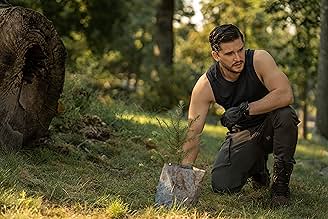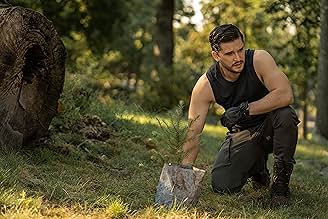तैंतीस वर्षों के दौरान घटित, बताई गईं आठ परस्पर जुड़ी हुई कहानियाँ यह पता लगाती हैं कि हमारे ग्रह की बदलती जलवायु कैसे हमारे परिवार, काम, विश्वास—और अस्तित्व को प्रभावित करेगी।तैंतीस वर्षों के दौरान घटित, बताई गईं आठ परस्पर जुड़ी हुई कहानियाँ यह पता लगाती हैं कि हमारे ग्रह की बदलती जलवायु कैसे हमारे परिवार, काम, विश्वास—और अस्तित्व को प्रभावित करेगी।तैंतीस वर्षों के दौरान घटित, बताई गईं आठ परस्पर जुड़ी हुई कहानियाँ यह पता लगाती हैं कि हमारे ग्रह की बदलती जलवायु कैसे हमारे परिवार, काम, विश्वास—और अस्तित्व को प्रभावित करेगी।
एपिसोड ब्राउज़ करें
फ़ीचर्ड समीक्षाएं
I am unsure if the broader audience will appreciate this, i feel as though they will feel that they are being educated vs entertained. I hope the season is able to strike a balance between entertaining and educating, otherwise it'll be a turn off. Some really uncomfortable topics being covered but also I assume reflective of what is currently happening but not known to the public, corporate greed and as a result the environment is impacted. Out of sight, out of mind. When I throw out my trash I see how many of my neighbours don't bother recycling and just dump everything. Soon we will be wearing face masks just to breathe air and not to avoid covid.
This series had a lot of potential and to be fair, it missed and achieved some of it.
The first episode is pretty preachy when it doesn't have to be so direct. They did some good world building but should have set up the story differently with better imagery and subtlety. The second episode by contrast has a much better vibe and feels exactly like what the rest of the episodes should have been, more or less.
Overall, it is worth a watch. At times it made me cringe because some of the writing was so cheesy. At other times I was impressed at how they showed some direct and indirect impacts of climate change on people's lives. It made me pretty emotional at times.
They need to make more movies and TV series like this. Using this series and the book Ministry for the Future could be a good foundation.
The first episode is pretty preachy when it doesn't have to be so direct. They did some good world building but should have set up the story differently with better imagery and subtlety. The second episode by contrast has a much better vibe and feels exactly like what the rest of the episodes should have been, more or less.
Overall, it is worth a watch. At times it made me cringe because some of the writing was so cheesy. At other times I was impressed at how they showed some direct and indirect impacts of climate change on people's lives. It made me pretty emotional at times.
They need to make more movies and TV series like this. Using this series and the book Ministry for the Future could be a good foundation.
Extrapolations has one of the best ensemble casts of any show I can remember (Ed Norton, Kit Harrington, Tobey Maguire, Matthew Rhys, Sienna Miller, Eiza Gonzalez, Meryl Streep, Marion Cotillard, Forrest Whittaker, Heather Graham, Gemma Chan, Keri Russell, Diane Lane, David Schwimmer, Nick Kroll, Mía Maestro, Daveed Diggs, Murray Bartlett, Judd Hirsch, etc). That is what I call a cast. A cast like like isn't signing up for a bad tv show and this isn't. I recommend this and please pay attention while doing so. This show tackles a subject that some people just refuse to listen to. I guarantee the people who are rating this badly probably haven't watch more than a minute of it.
I shut lights off when I leave rooms, I conserve water, I recycle. Yet in the time it takes me to write this review, 20 of the world's worst polluters will contribute more to global warming than my household could in my entire lifetime.
Series like Extrapolations are trying to convey an important message. It has an all-star cast, well-developed characters and multi-faceted storylines, but ultimately, what is a series like this hoping to achieve? The average person can only do so much, yet we're expected to shoulder the burden that belongs to the world's most powerful.
I appreciate the intention of series like this one, but ultimately for me it misses the mark. I can't stomach the anxiety of being told things are horrible while doing my level best to be a good steward of our planet. I wanted to like this series but found it discouraging and tone deaf at best.
Series like Extrapolations are trying to convey an important message. It has an all-star cast, well-developed characters and multi-faceted storylines, but ultimately, what is a series like this hoping to achieve? The average person can only do so much, yet we're expected to shoulder the burden that belongs to the world's most powerful.
I appreciate the intention of series like this one, but ultimately for me it misses the mark. I can't stomach the anxiety of being told things are horrible while doing my level best to be a good steward of our planet. I wanted to like this series but found it discouraging and tone deaf at best.
This series may not receive good reviews from acritical viewers, but it's an awesome piece of rhetoric worth watching, learning about & sharing... Here's why...
First, some context:
My first encounter with global warming was Rachel Carson's 1953 book "The Sea Around Us"- which I read when I was b/n 5 & 10 (around Regan's 1st term in DC.). My first experience with solar power was a house I was fortunate enough to call home when I was in junior high... in New England (pre-1990). That experience didn't resonate though until I arrived in Hawai'i in the early aughts- and rooftop solar was RARE. To say I've been mindful of climate change and environmental concerns for a while would be accurate- but it's only half of the story. The other part I've paid attention to is trends about climate change in news reporting, discourse and rhetoric- both within the US, globaly and around weather-related events which may make headlines for a while before giving way to whatever comes next. In addition to those 4+ decades of awareness, I recently read "Ministry for the Future" by Kim Stanely Robinson a month or two ago. While I haven't read the most recent reports from the UN, the IPCC or independent assessments of them (as of March 29th, 2023, anyway...), I remember watching the February 2022 UN IPCC briefing live, just days after Putin had invaded Ukraine. One final context tidbit: In the past week or two, the UN and IPCCC put out a new report. Though I can't speak to that most recent report- four episodes into this series, my impression is this series is, well, nailing it.
For additional context, I'm not a bookworm or armchair quarterback. I made a point to do as much traveling as I could before I turned 30: every US state except Alaska, an awesome experience backpacking in Europe pre-Euro, and even a "work" trip to the Middle East in 2007/08. Add to that motorcyclist, PADI certified and- regretably- 10 years into trying to recover from a spinal cord injury. (Meaning, over the past ten years, paying attention to the stuff I do has also functioned as a welcome distraction from my own hot mess.)
Given that context, here's what I think about Extrapolations S1:E1 - E4 (though I'll revisit this after the current season ends.)
Seriously.... Everything I've seen so far in the series makes sense. However, some viewers will feel awkward watching this series- by design. But that takeaway also makes sense: This is not comfortable, "happy, happy joy-joy" subject matter. It isn't designed to get laughs or to make people feel happy or good. As for technical merit, Judging by the pacing, cinematography, characters, lines, exposition and how different topics are being approached, I'd argue it's been designed to make people think... really think. (Judging by ratings, reviews and comments- this production is having an impact.)
As an earlier adopter type, online since 1991- I'm always trying to figure out what might happen *next* and have thoroughly enjoyed each episode so far. Again, the production quality is high- which helps, but I can totally imagine what others might think and how they might feel by watching this series- regardless of their relationship to climate change.
What will happens next in the series? I have no clue. But in the real world, I'm afraid nothing will change as much as it needs to until individuals change their behavior *and* the behaviors of businesses and governments, too. (And the sooner, the better.)
First, some context:
My first encounter with global warming was Rachel Carson's 1953 book "The Sea Around Us"- which I read when I was b/n 5 & 10 (around Regan's 1st term in DC.). My first experience with solar power was a house I was fortunate enough to call home when I was in junior high... in New England (pre-1990). That experience didn't resonate though until I arrived in Hawai'i in the early aughts- and rooftop solar was RARE. To say I've been mindful of climate change and environmental concerns for a while would be accurate- but it's only half of the story. The other part I've paid attention to is trends about climate change in news reporting, discourse and rhetoric- both within the US, globaly and around weather-related events which may make headlines for a while before giving way to whatever comes next. In addition to those 4+ decades of awareness, I recently read "Ministry for the Future" by Kim Stanely Robinson a month or two ago. While I haven't read the most recent reports from the UN, the IPCC or independent assessments of them (as of March 29th, 2023, anyway...), I remember watching the February 2022 UN IPCC briefing live, just days after Putin had invaded Ukraine. One final context tidbit: In the past week or two, the UN and IPCCC put out a new report. Though I can't speak to that most recent report- four episodes into this series, my impression is this series is, well, nailing it.
For additional context, I'm not a bookworm or armchair quarterback. I made a point to do as much traveling as I could before I turned 30: every US state except Alaska, an awesome experience backpacking in Europe pre-Euro, and even a "work" trip to the Middle East in 2007/08. Add to that motorcyclist, PADI certified and- regretably- 10 years into trying to recover from a spinal cord injury. (Meaning, over the past ten years, paying attention to the stuff I do has also functioned as a welcome distraction from my own hot mess.)
Given that context, here's what I think about Extrapolations S1:E1 - E4 (though I'll revisit this after the current season ends.)
Seriously.... Everything I've seen so far in the series makes sense. However, some viewers will feel awkward watching this series- by design. But that takeaway also makes sense: This is not comfortable, "happy, happy joy-joy" subject matter. It isn't designed to get laughs or to make people feel happy or good. As for technical merit, Judging by the pacing, cinematography, characters, lines, exposition and how different topics are being approached, I'd argue it's been designed to make people think... really think. (Judging by ratings, reviews and comments- this production is having an impact.)
As an earlier adopter type, online since 1991- I'm always trying to figure out what might happen *next* and have thoroughly enjoyed each episode so far. Again, the production quality is high- which helps, but I can totally imagine what others might think and how they might feel by watching this series- regardless of their relationship to climate change.
What will happens next in the series? I have no clue. But in the real world, I'm afraid nothing will change as much as it needs to until individuals change their behavior *and* the behaviors of businesses and governments, too. (And the sooner, the better.)
क्या आपको पता है
- ट्रिवियासभी एंट्री में स्पॉइलर हैं
- कनेक्शनReferenced in kuji: Ramiz Aliev: Exposing the Climate (2024)
टॉप पसंद
रेटिंग देने के लिए साइन-इन करें और वैयक्तिकृत सुझावों के लिए वॉचलिस्ट करें
- How many seasons does Extrapolations have?Alexa द्वारा संचालित
विवरण
इस पेज में योगदान दें
किसी बदलाव का सुझाव दें या अनुपलब्ध कॉन्टेंट जोड़ें









































